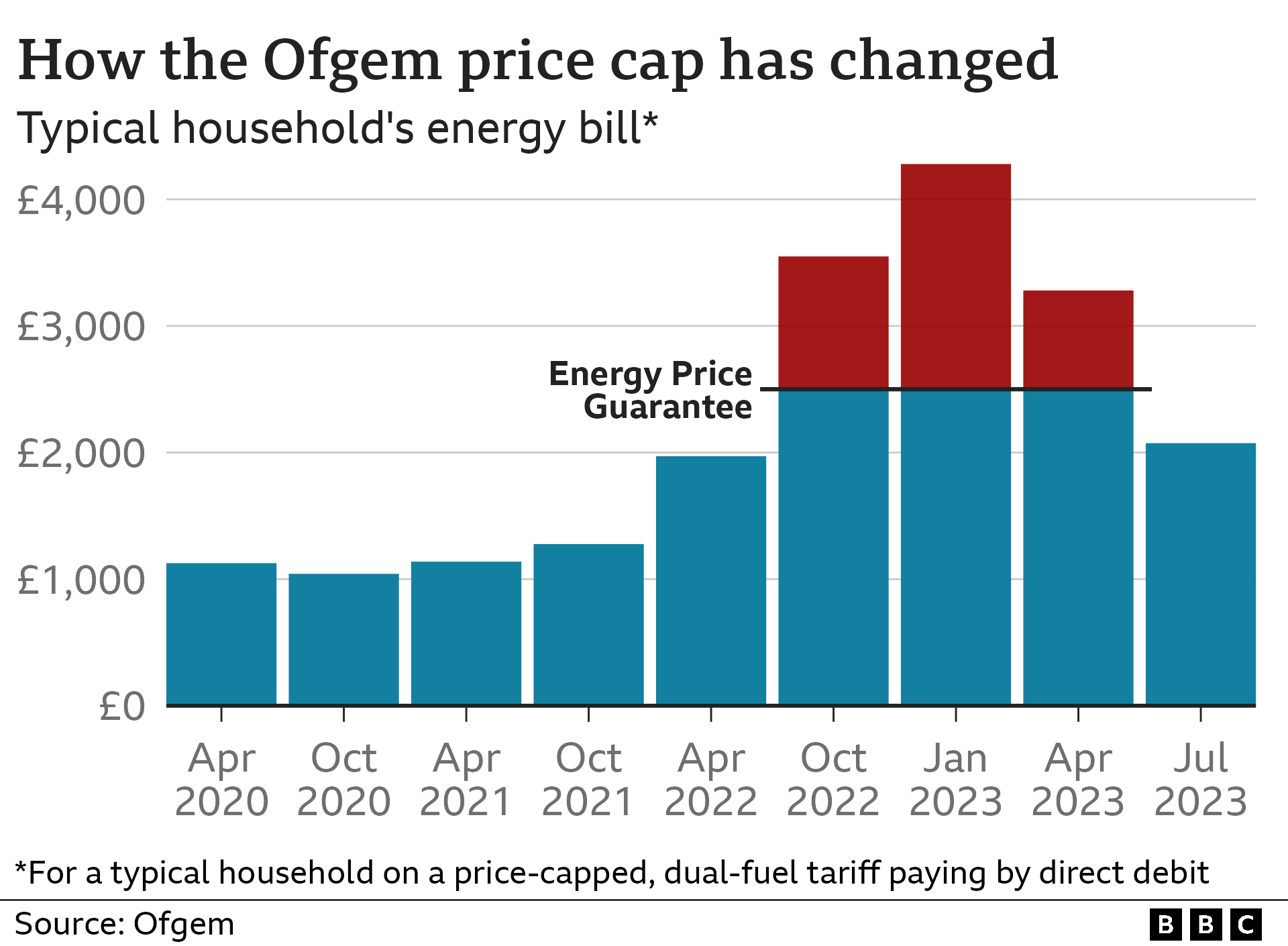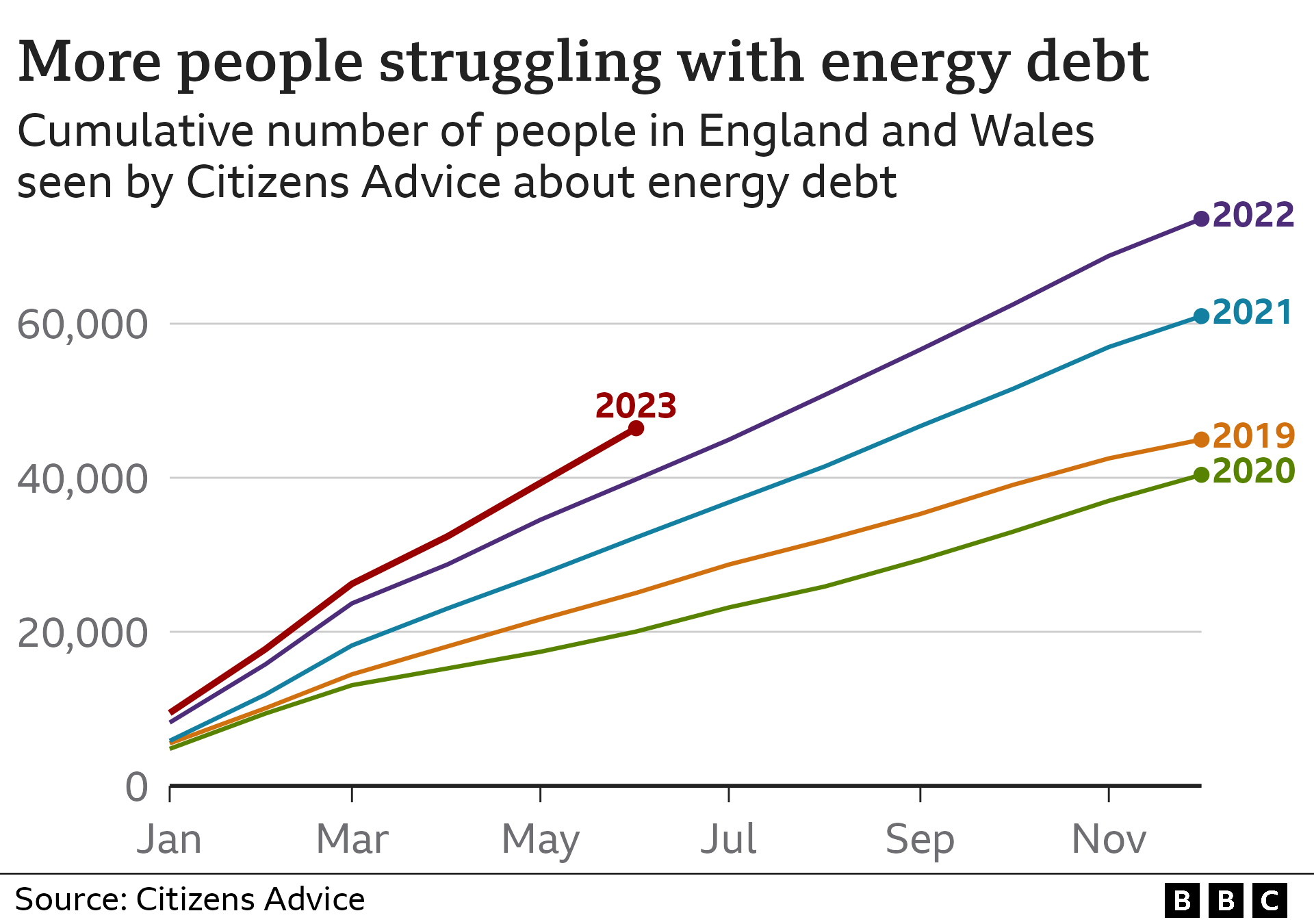
Energy regulator Ofgem will announce the next price cap affecting the bills of 29 million households in England, Wales and Scotland early on Friday.
It will reduce the cap, bringing down the cost of each unit of energy for the three months from October.
Analysts suggest a typical annual bill could be £150 cheaper than now, and nearly £600 down on last winter.
But reduced government support and higher fixed costs mean many will see little difference in what they pay.
How the cap works
Ofgem’s price cap is now set every three months, partially to reflect changes in wholesale prices which are paid by suppliers. It sets the maximum amount that suppliers can charge for each unit of energy but not the total bill. If you use more, you will pay more.
For a home using a typical amount of gas and electricity and paying by direct debit, the current annual bill is £2,074. Analysts at consultancy Cornwall Insight expect this to fall to £1,926 in October, with a similar fall for those who pay via prepayment meters.
This is lower than the £2,500 a year paid last winter and spring, when the government stepped in to limit bills after costs rocketed following Russia’s invasion of Ukraine last year.
However, that government-set cap is no longer needed and last winter’s discount to every household, which was paid in six instalments each of about £66 between October and March, has finished.
Bills will still be considerably higher than the typical level of £1,277 a year which was paid in the winter of 2021.

Although bills appear to be falling again, the impact is likely to be limited.
There are no plans to repeat the universal discount of £400 funded by the government last winter.
Standing charges, a fixed daily payment covering the costs of supply and other levies, have been rising and are expected to continue to go up.
They, like the overall cap, vary by region, with some areas such as North Wales and Merseyside paying more. That will have more of an effect on those with relatively low energy use, who cannot cut back any further to reduce their bill.

Jay Cross, who runs a barbers shop, said he and his wife Andrea found their direct debits were failing to cover their bills last year.
“We ran over on the bills and then made payment plans to catch up with it,” he said.
“We’ve got no choice, we’ve got to have the heating on – especially with the baby. We’re still in arrears but we are going to get back on top of it ready for this winter.”
Charity Citizens Advice said it had seen a greater number of people who were behind on energy bills than in previous years.

A total of 46,431 people with energy debts contacted the charity for advice in the first six months of the year, a 17% increase on the same period last year.
Those who contacted Citizens Advice for help had debts averaging £1,711, up a third on 2019, the charity said.
Analysts suggest bills are unlikely to fall significantly for the next decade.
The government said it had spent nearly £40bn putting a limit on bills throughout last winter, since when wholesale energy prices – as well as the costs for consumers – had dropped. Additional help was being offered through schemes like the Warm Home Discount.
Cost-of-living payments will continue to be made to people on lower incomes and those receiving certain benefits to help with high bills.
Mike Thornton, chief executive at Energy Saving Trust, said: “Energy prices are still high and we may see increases again this winter, so the message for government hasn’t changed.
“Addressing the root causes – not least our over-reliance on gas – to permanently lower energy prices is more important than ever.”

Here are some energy saving ideas from environmental scientist Angela Terry, who set up One Home, a social enterprise that shares green, money-saving tips:
- Get a water-efficient shower head free of charge from your water company and use showers rather than baths
- Consider loft insulation, which she says costs around £680 for a typical semi-detached home and could save £285 a year on gas bills
- Hang out washing instead of using a tumble dryer, and walk instead of drive when possible
- Use windy days to feel where draughts are in the house. Wetting the back of your hand helps to locate them, then use insulation or draught-proofing tape
- Where available, press the smaller button to use less water to flush the toilet
What can I do if I can’t pay my energy bill?

Related Topics
- Money
- Ofgem
- Personal finance
- Energy industry
-
Thousands will start winter behind on energy bills
-
20 hours ago

-
-
What is the energy cap and what’s happening to bills?
-
1 day ago

-
-
Who is getting extra cost-of-living payments?
-
17 hours ago

-
-
What can I do if I can’t pay my energy bill?
-
1 day ago

-





